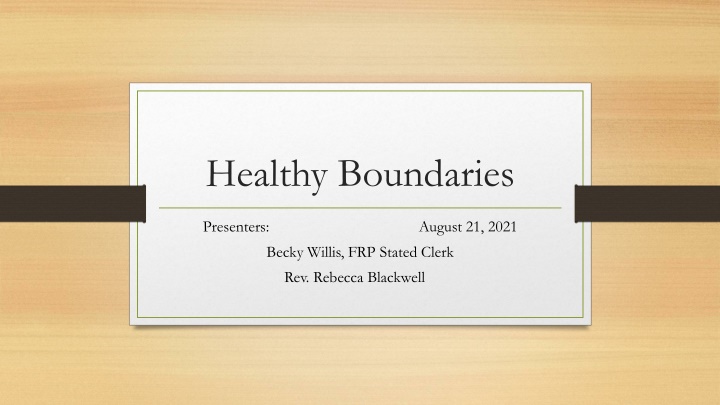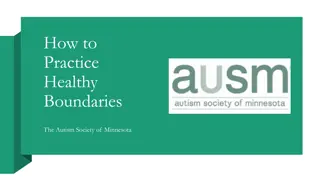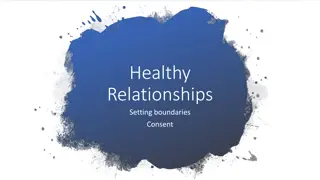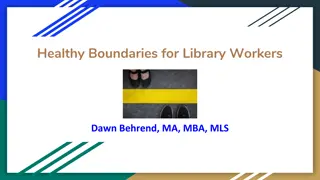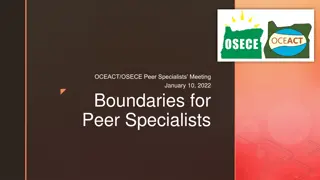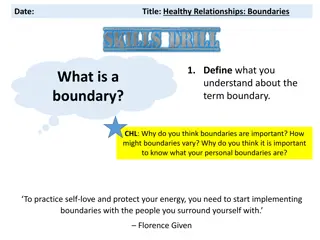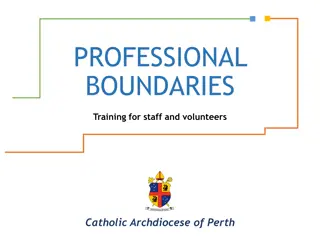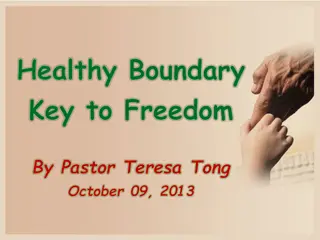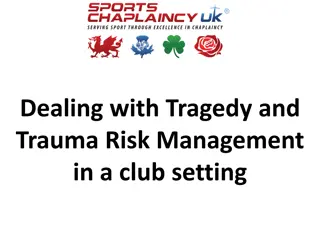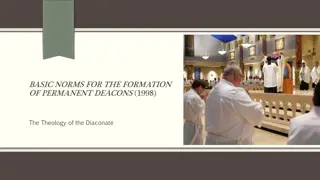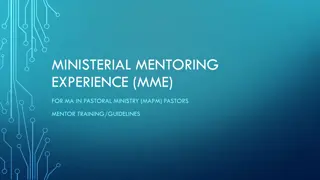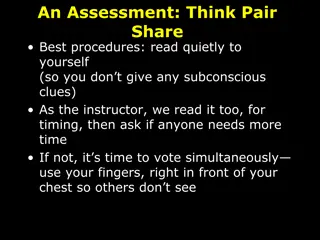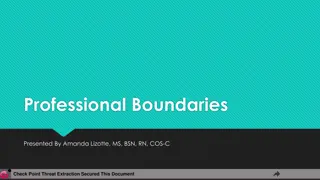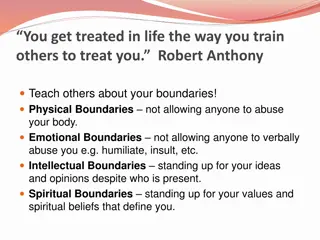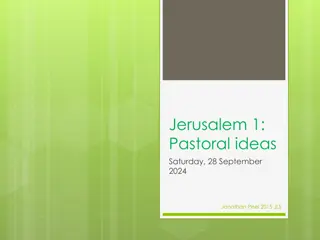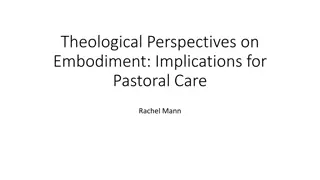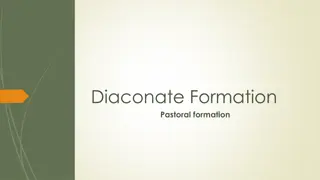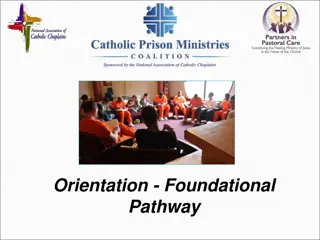Establishing Healthy Boundaries in Pastoral Ministry
The importance of boundary training in the Presbyterian Church (USA) to prevent sexual abuse and protect children and youth is highlighted. Failure to set personal boundaries can lead to burnout in ministry. Key struggles for pastoral leaders include job description, work hours, and managing expectations. Principles and biblical examples emphasize the necessity of setting boundaries to maintain balance and effectiveness in ministry.
Download Presentation

Please find below an Image/Link to download the presentation.
The content on the website is provided AS IS for your information and personal use only. It may not be sold, licensed, or shared on other websites without obtaining consent from the author.If you encounter any issues during the download, it is possible that the publisher has removed the file from their server.
You are allowed to download the files provided on this website for personal or commercial use, subject to the condition that they are used lawfully. All files are the property of their respective owners.
The content on the website is provided AS IS for your information and personal use only. It may not be sold, licensed, or shared on other websites without obtaining consent from the author.
E N D
Presentation Transcript
Healthy Boundaries Presenters: August 21, 2021 Becky Willis, FRP Stated Clerk Rev. Rebecca Blackwell
Why Do We Have Boundary Training? * The Book of Order provides that all councils of the Presbyterian Church (USA) shall have sexual abuse policies and child and youth protection policies. (G-3.0106) Training is the key to establishing and keeping healthy boundaries and being aware of any blind spots we might have. * The programmatic policy manual of the Committee on Ministry, under the authority of Flint River Presbytery, requires training every three years. * Aside from the requirements, it is a best practice to embrace the freedom and protection we have from setting and keeping boundaries in our lives.
Personal Boundaries I Am Available 24/7 (NOT!) *Failure to set and maintain personal boundaries is the number one ministry problem, according to a study at Fuller Theological Seminary. * The very personal nature of ministry can lead to overload and burnout unless the minister finds practical ways to gain balance. The concept of boundary setting is an essential idea that must be put into practice if ministers are to remain balanced and effective. (Rev. Dr. Raymond Pendleton, Senior Professor of Counseling, Gordon-Conwell Theological Seminary) *Key boundary struggle areas for most pastoral leaders revolve around ministry areas such as job description, work hours, staff issues, and expectations of others concerning both your professional AND personal life. * Being a pastor or ministry worker is like being a stray dog at a whistler s convention. (Anonymous) Which way do I go next? How can I please everyone? You can t!
Four Principles for Personal Boundaries in Pastoral Ministry * Your first covenant relationship is with God. * Crises do demand our attention (note the word crises ) * Scheduling is a battleground *Beware the physical, mental, and time drain of counseling
Biblical Examples of Personal Boundaries * Enthusiasm without knowledge is not good; haste makes mistakes. (Proverbs 19:2) * Be very careful then, how you live not as unwise but as wise, making the most of every opportunity. (Ephesians 5:15-16) * For everything there is a season, a time for every activity under heaven. (Ecclesiastes 3:1) * The prudent see danger and take refuge, but the simple keep going and pay the penalty. (Proverbs 22:3)
Is Your Church Safe? Let the little children come to me; do not stop them; for it is to such as these that the Kingdom of God belongs. (Mark 10:14) The Book of Order provides that all councils of PCUSA should have sexual misconduct policies and children and youth protection policies. (G-3.0106). Here are a few concerning statistics about abuse and the consequences: One out of four girls and one out of six boys will be abused before the age of 18. 80 percent of abuse is not reported. Abuse destroys a child s well-being and sense of trust. Sexual predators seek out trusting environments where children are present. Churches are vulnerable because of close relationships, trusting environments, and immediate access to children. Allegations of abuse threaten the church s mission and reputation. Court awards in abuse cases can cost churches millions of dollars. Source: Insurance Board Praesidium, Inc. PCUSA
State Law and Community Resources Georgia (and other states) mandates reporting of suspected abuse by specific people who have contact with children. The Book of Order also speaks to Mandatory Reporting (G-4.0302): Any member of this church engaged in ordered ministry and any certified Christian educator employed by this church or its congregations, shall report to ecclesiastical and civil legal authorities knowledge of harm, or the risk of harm, related to the physical abuse, neglect, and/or sexual molestation or abuse of a minor or an adult who lacks mental capacity when (1) such information is gained outside of a confidential communication as defined in G-4.0301, (2) she or he is not bound by an obligation of privileged communication under law, or (3) she or he reasonably believes that there is risk of future harm or abuse. Mandated reporters who report suspected abuse in good faith are protected by law, even if the report is not substantiated by the Department of Family and Children Services (DFCS) or another reporting agency. All reports are confidential, and the reporter may remain anonymous, if so desired. It is the responsibility of DFCS and law enforcement to investigate the allegation of child abuse. In addition to child abuse, adult abuse also occurs. Although the laws are different for mentally capable adults, who may refuse any services from DFCS, reporting of suspected abuse or neglect may be prudent. To help in preventing abuse, Flint River Presbytery works with sessions and congregations to provide access to background checks, which should be completed on all employees and volunteers who work with children. IMPORTANT: Reporting of allegations of abuse or misconduct within the church may occur in a variety of ways. Because a congregation, session, presbytery, or any council cannot control to whom the alleged victim of misconduct or abuse may speak to first, it is important that pastors, officers, elders, employees, and volunteers understand how to channel reports of incidents. Section D (The Rules of Discipline) of the Book of Order goes into great detail about the procedures. Please make sure you and all leadership are aware of these procedures.
Boundary Awareness Secrecy is NOT the same as confidentiality. In general, adults have more power than children and youth. Whether in truth or by perception, pastors and church leaders have more power than people with whom they have a pastoral/leadership relationship. The mutuality of friendship cannot exist when there is a disparity of power. For the safety of all concerned, at least two unrelated adults should be present and maintain visual contact with each other as they engage in ministry to children and youth whether in the church or on trips, where more adults are probably needed. Doors should remain open or at least have windows to protect children and youth as well as those ministering to them. Very intentional care should be exercised with pastoral counseling to avoid even the appearance of impropriety or to provide an opportunity for improper behavior on the part of either person. SOCIAL NETWORKING should be just as transparent as an open door or window in the door in a physical building. Church technology (computers, etc.) should never be used to access inappropriate content.
Case Study #1 Marie is recently out of seminary and serving in her first church. Her student debt load is high, the pay from the church is not as much as she would like (although she was grateful for the pastoral call), and she is struggling with trusting God to meet her needs. It is becoming clearer and clearer that she will not be able to make her student loan payments. Finally, she decides to ask the Finance Committee about increasing her salary, but they make it clear that the church budget cannot be expanded, or the terms of her call be changed. After the meeting, filled with doubt and uncertainty about whether she needs to give up on ministry altogether, she receives a call from Thomas, a session member. Thomas says he has money in reserve and would like to help Marie by paying a portion of her student debt. Don t worry about paying me back right away. I just want to help you and lessen your worries. But we ll need to keep this a secret because others in the church might not approve, Thomas says. Marie wonders, Is this an answer to my prayers? Or is it a trap to avoid? Things might go wrong, but it also might be the solution to my problems and let me continue my ministry here. And, after all, Thomas is an elder and a nice person. What is the underlying problem? What are contributing factors? What can or should be done? (Adapted from training by Ross D. Peterson, D. Min. Midwest Ministry Development Service)
Case Study #2 The session is so excited! In the newly elected class of Ruling Elders, a young man named Peter has been ordained and installed. The session is so encouraged to have a young adult willing to serve on the session, and everyone is looking forward to new ideas, learning new technology, and having the infusion of this young person into the leadership of the church. Peter is also excited! Many great ideas are running through his mind, and he wants to implement these ideas as quickly as possible. Peter also wants to work with the teenagers and is welcomed into this ministry by the Youth Minister. As with most young people, social media is second nature to Peter. So, without consulting the session or the Youth Minister, Peter takes it upon himself to post pictures and names of the teenagers, along with pictures of some of their younger siblings, on social media under his own personal accounts. As parents begin to see and hear about these posts, some are nonplussed, but several are quite upset that pictures and names of their children were posted on social media without their consent. Peter is crushed by the criticism! He only wanted to show positive information about the church and the children and youth programs. He never imagined this would create a problem! He now wonders if he has made a mistake in accepting his role as a Ruling Elder. What is the underlying problem(s)? What are contributing factors? What can be done?
Learning to Lead Like Jesus And so, dear brothers and sisters, I plead with you to give your bodies to God because of all He has done for you. Let them be a living and holy sacrifice the kind He will find acceptable. This is truly the way to worship Him. Do not copy the behavior and customs of this world, but let God transform you into a new person by changing the way you think. Then you will know God s will for you, which is good and pleasing and perfect. (I Cor. 12:1-2) (emphasis mine) Lead with Humility: Pride makes us artificial; humility makes us real. (Merton) Lead with Love: Love your neighbor as yourself. (Matthew 22:39) Lead with Accountability: It is not only what we do, but also what we do not do, for which we are accountable. (Moliere) Lead with Relationships: Shared joy is a double joy; shared sorrow is half a sorrow. (Swedish Proverb) Lead with Teachability: Being ignorant is not so much a shame as being unwilling to learn. (Franklin) Lead with Discipline: You must arrange your days so that you are experiencing deep contentment, joy, and confidence in your everyday life with God. (Ortberg) Lead with Gratitude: I would maintain that thanks are the highest form of thought; and that gratitude is happiness doubled by wonder. (Chesterton) Lead with Generosity: A generous person will prosper; whoever refreshes others will be refreshed. (Proverbs 11:25) Lead with Forgiveness: Resentment is like drinking poison and then hoping it will kill your enemies. (Anonymous source) Lead with Encouragement: We need each other for the moments when we ve got to borrow the strength of each other s words, borrow a friend s faith that lifts us up, borrow a little encouragement just to carry us through the day. (Voskamp) Lead with Faithfulness: Faithful servants never retire. You can retire from your career, but you never retire from serving God. (Warren)
Resources Abuse and Misconduct Reporting Agencies: Local DFCS Insurance Board Praesidium, Inc. (PCUSA) 866-607-SAFE (7233) prevention@gacfca.org www.georgiacenterforchildadvocacy.org Books and Other Resources: Boundary Setting for Clergy and Ministry Workers by Dr. Jim Stout Learning to Lead Like Jesus by Boyd Bailey The Integrity of the Body of Christ by Arden F. Mahlberg and Craig L. Nessan Confidentiality and Clergy: Churches, Ethics, and the Law by William W. Rankin The Book of Order of the Presbyterian Church (USA) 2019-2021 Edition Presbyterian Mission of Presbyterian Church (USA) www.presbyterianmission.org
Book Resources from Rebecca Blackwell A Beginner s Guide to Crossing Cultures: Making Friends in a Multi-Cultural World by Patty Lane Waking Up White by Debby Irving Me and White Supremacy by Layla F. Saad Joy Unspeakable by Barbara Holmes Color of Compromise: The Truth About the American Church s Complicity in Racism by Jemar Tisby (video series on PBS and a book also) Relating to People of Other Religions: What Every Christian Needs to Know by M. Thomas Thangaraj (Abingdon Press)
